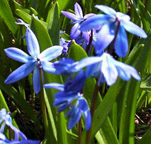Green gardening in full bloom
 As we arrive in the full bloom of spring, the focus on the garden starts once again and many people in the riding are spending a few weekends and evenings working on their front, side and back yard gardens in an effort beautify their part of the city. But as common as this instinct is, the practice of green gardening is not as wide spread as gardening itself in the city.
As we arrive in the full bloom of spring, the focus on the garden starts once again and many people in the riding are spending a few weekends and evenings working on their front, side and back yard gardens in an effort beautify their part of the city. But as common as this instinct is, the practice of green gardening is not as wide spread as gardening itself in the city.
April 2009 marked a shift as both the province and the city have moved to ban pesticides that in the past have presented significant problems for water pollution in the form of harmful chemicals that persist in our yards and also end up in the sewer system as run off that can eventually make its way to our drinking water in Lake Ontario. With the removal of these harmful elements from use in urban gardens one might think that the state of green gardening is moving ahead in the city, but the truth is that pesticides are only part of the picture.
Many people knowingly or otherwise make use of chemical fertilizers that can also have a negative effect on our eco system. A move to fully organic gardening is a shift that would help not only improve the environmentally friendly practices in our home but can teach us some lessons about what natural methods can do to create really great gardening results.
Judy Tate, from East End Garden Centre at Queen & Coxwell says that one of the most important questions that one can ask is what mix of products are you currently using and what replacements cn you make to be more environmentally responsible? “Right now, the consumer can only use what’s on the market but one of the biggest challenge is that product knowledge of alternatives is lagging the changes in regulation,” says Tate. “For example controlling grubs on a lawn is something that people can take a safe chemical free approach to with the use of Nematodes, earth friendly microscopic worms that are found naturally in garden soil.”
Nematodes work by attaching onto a grub and feeding off the host until the grub is dead, a process that usually takes 2 to 3 days. Nematodes do not attack desirable insects such as earthworms and when there are no more hosts to consume the nematodes die. Nematodes are sold on small sponges with millions on each sponge. When the sponge is immersed in water, the nematodes are release into the water and this solution can be easily sprayed of the lawn and garden. More information can be found at www.eastendgardencentre.ca
Another are where gardening can take steps to be more eco friendly is in setting up for and then using rain water for our gardens. With storm sewer overflow being one of the biggest problems facing our water system, setting up rain barrel to capture run off from eves is a practical and beneficial method for both reducing your water bill hand helping to keep excess water out of our city’s storm sewer system. Watering the garden and the lawn is one of the most common activities that gets done on a regular basis by gardeners and the use of an eco friendly rain barrel can help to ensure that we are able to make the most out of what nature provides, keep our gardens green and reduce what we put into our sewer system. Rain barrels that are specifically outfitted to do the job can be found at a number of locations including the GrassRoots Store on Chester and Danforth. (www.grassrootsstore.com)
Many people in the city tend to purchase their plants and gardening supplies from the seasonal garden centres of large retailer grocery stores or home centres. While this pattern may offer some cost benefits to consumers, the choice often lacks access to knowledgeable staff who can guide consumers on eco friendly gardening practices and resources. Making sure that you can get real answers to real questions.
For example the concept of managing pests with an organic approach as opposed to chemicals is not something that is widely known among many big box garden centre employees. But the simplicity of the ideas can be so easy to grasp it would seem like it was just an obvious truth that appeared right in front of your eyes.
One example is using insects to tackle an insect problem. Kate Porter from Bill’s Garden Centre on Pape south of Mortimer notes how simple solutions like lady bugs and preying mantis can more than address the full scope of insect pest management needs for many gardeners.
“We offer bags of 100 dormant lady bugs who when awakened by normal outdoor temperature (they are stored in a refrigerator) will do a great job of attacking aphids, one of the most commons pests in a garden,” said Porter. “Another alternative we offer is egg sacs for preying mantis that can be put in a garden shrub and within 3 or 4 weeks will release 100 to 300 of the insects who attack almost all of the insect pests we find in the average garden.”
A lessoned learned is that working with nature with natural solutions to address our gardening needs can help everyone achieve not only great gardening results but to ensure that the garden is a positive addition to our ecosystem and not something that causes damage to the natural world we live in.
| — Lars Hansen on 2009 May 18 in Ecology & sustainability, Fun |
